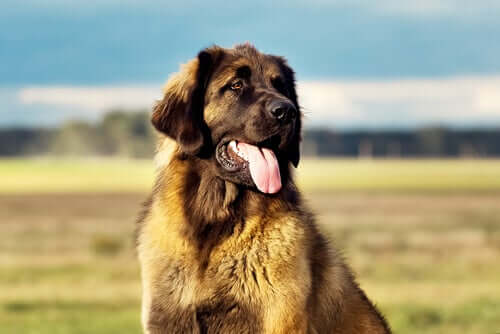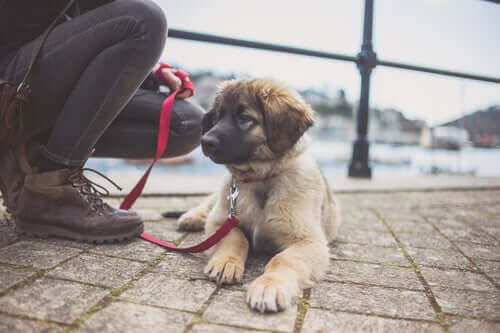Meet the Leonberger: A Dog Breed from Germany

We’re going to meet another very peculiar furry friend who comes from Germany: the Leonberger. A long-haired noble giant that was born from the crossing of great breeds. Would you like to discover more? Let’s get to it.
Everything you need to know about the Leonberger
History
This dog breed is like many others of which their exact origin is still unknown. All we know is that they appeared in very remote times. And we can’t talk about the Leonberger without speaking of the Tibetan Mastiff or Tibetan Dogo. This dog has its origin in the Himalayan mountain range and played an important role in the development of the Leonberger breed, as they are one of their descendants.
By the year 1844, there were records and writings that defined the characteristics of the Dogo’s descendants very well. These descriptions coincided perfectly with the Leonberger’s traits. Therefore, this makes it clear that the animal comes from the Tibetan Dogo, and was possibly mixed with the St. Bernard or Newfoundland dog breed.
What’s now clear is that they have their origin in the German city bearing almost the exact same name, Leonberg. By the year 1625, there were already records of some specimens belonging to this breed in Austria. In addition, it’s also known that Marie Antoinette owned one specimen that had a height of 40 inches.
Later, this dog was a favorite among the imperial courts of Austria and thus spread throughout Europe.
General characteristics
The Leonberger is a large, very robust dog and of good proportions. Consequently, they can measure between 30 and 33 inches at the withers in the case of males, and between 25 and 29 inches in the case of females. In addition, their weight varies between 130 and 165 lbs.

Their limbs are muscular and possess a very narrow head in relation to their bodies, showing more depth than width. However, their eyes have a calm look that gives off tenderness and kindness. The tail will always be fluffy and with a lot of hair. In addition, their ears are fleshy, moderately sized, and pendant shaped.
This dog has two layers of hair: an outer semi-soft, dense and very long first layer and an inner, short, dense and attached to the skin second one. Thus, an ideal coat with protection against low temperatures. Their legs and snouts are short, while the rest of their bodies will be of medium length. Common colors found are fawn, gold to red, with a black and brown face mask. In addition, nose leather, footpads and lips should always be black.
Character
Leonbergers are calm dogs – something that’s reflected in their gaze. They’re intelligent and confident, as well as very loyal and docile, qualities that make training them very easy. However, due to their tenderness, this training should be firm yet kind at the same time. They can’t stand scolding or shouting; they’ll close up and refuse to learn anything.
It’s an ideal watchdog, as they’re not afraid of strangers and usually don’t like them. Being a family dog, they’ll be willing to give their lives for protecting their loved ones if necessary. Leonbergers gets along great with children because, although they’re like big dolls in the eyes of children, they love all kinds of caresses and cuddles.
In sum, proper control and early socialization and training are essential, as this is a giant breed.
Care
Due to their size, it’s necessary that they have enough space to live in, as well as a good dose of daily exercise. They don’t require special care except for brushing their hair often.
Leonbergers are usually lazy, so you will probably need to “force” them to exercise or even do some muscle-strengthening movements at home.
Due to their size, they have a tendency to suffer from hip dysplasia and a twisted stomach. In addition, Leonbergers can inherit and/or develop heart problems, inherited Leonberger paralysis/polyneuropathy and other diseases.
We hope you enjoyed today’s article about this noble German dog with tender eyes and kind character. Would you like to have one as a pet?